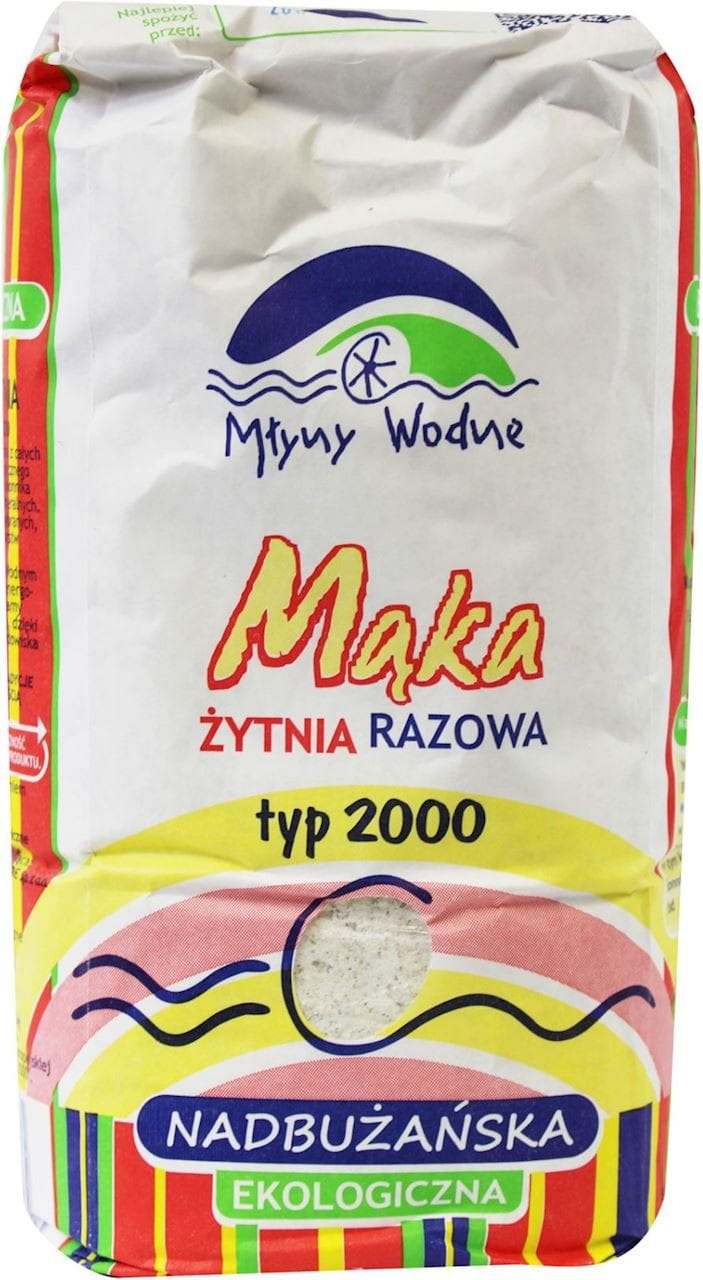Wholemeal rye flour from the Bug River Type 2000 BIO 1 kg - WATER MILLS
- Regular price
- €3,89
- Regular price
-
- Sale price
- €3,89
- Unit price
- per
Couldn't load pickup availability
Description
x Rye flour has a lower gluten content than wheat flour. It also has a darker, greyish-brown color. It is also more nutritious and contains more micronutrients than wheat flour.
Rye flour contains minerals like potassium, calcium, zinc, manganese and copper. It is also a source of B vitamins, vitamin E and fiber. The roughage contained in the flour ensures a feeling of satiety and has a positive effect on intestinal peristalsis. By consuming rye flour products, we supply the body with phenolic acids, which have an antioxidant effect. This means they help reduce free radicals and have a protective effect on cells. In addition, they are a source of phytoestrogens, which have a positive effect on the cardiovascular system.
The flour is of type 2000, which means that it is a whole grain flour that contains higher nutritional value and valuable micronutrients than lower type flours.
Rye flour can be used to bake rye bread, cakes and pancakes.
INGREDIENTS
Wholemeal rye flour * Type 2000 (* from certified organic farming)
RECOMMENDED STORAGE CONDITIONS
Store cool and dry.
similar products
- Regular price
- €3,89
- Regular price
-
- Sale price
- €3,89
- Unit price
- per
- Regular price
- €3,89
- Regular price
-
- Sale price
- €3,89
- Unit price
- per
- Regular price
- €3,89
- Regular price
-
- Sale price
- €3,89
- Unit price
- per
- Regular price
- €3,89
- Regular price
-
- Sale price
- €3,89
- Unit price
- per
- Regular price
- €3,89
- Regular price
-
- Sale price
- €3,89
- Unit price
- per
- Regular price
- €3,89
- Regular price
-
- Sale price
- €3,89
- Unit price
- per
- Regular price
- €3,89
- Regular price
-
- Sale price
- €3,89
- Unit price
- per
- Regular price
- €3,89
- Regular price
-
- Sale price
- €3,89
- Unit price
- per
- Regular price
- €3,89
- Regular price
-
- Sale price
- €3,89
- Unit price
- per
- Regular price
- €3,89
- Regular price
-
- Sale price
- €3,89
- Unit price
- per
Recently Viewed Products
- Regular price
- €3,89
- Regular price
-
- Sale price
- €3,89
- Unit price
- per
- Regular price
- €3,89
- Regular price
-
- Sale price
- €3,89
- Unit price
- per
- Regular price
- €3,89
- Regular price
-
- Sale price
- €3,89
- Unit price
- per
- Regular price
- €3,89
- Regular price
-
- Sale price
- €3,89
- Unit price
- per
- Regular price
- €3,89
- Regular price
-
- Sale price
- €3,89
- Unit price
- per
- Regular price
- €3,89
- Regular price
-
- Sale price
- €3,89
- Unit price
- per
- Regular price
- €3,89
- Regular price
-
- Sale price
- €3,89
- Unit price
- per
- Regular price
- €3,89
- Regular price
-
- Sale price
- €3,89
- Unit price
- per
- Regular price
- €3,89
- Regular price
-
- Sale price
- €3,89
- Unit price
- per
- Regular price
- €3,89
- Regular price
-
- Sale price
- €3,89
- Unit price
- per
- Choosing a selection results in a full page refresh.











